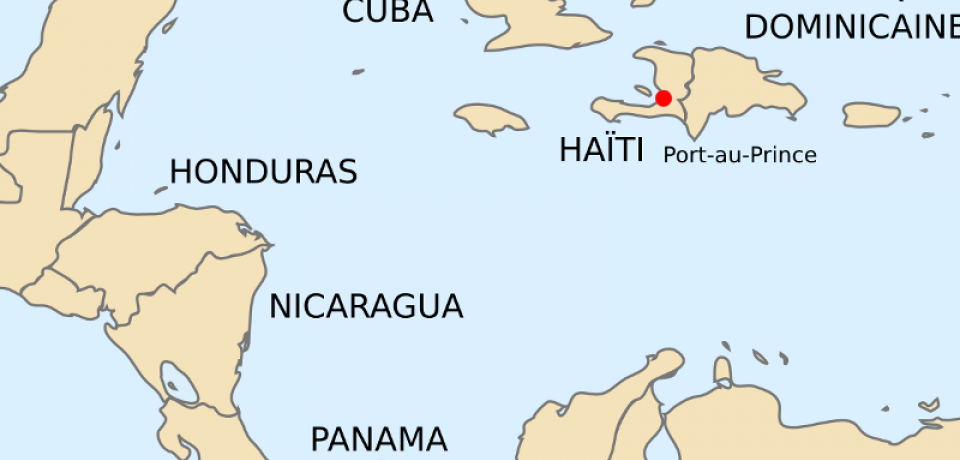
The earthquake that took place in Haiti on 12 January 2010 affected the entire country but hit the capital city Port au Prince and the neighbouring region especially hard. The human and material damage has been catastrophic, with more than 200,000 dead and thousands of injured and homeless. The extreme poverty of recent decades, precarious living conditions and housing, and a police state that cares nothing for the needs of the population or for the precautions required in an earthquake-prone region, are the reason this disaster has had such a high human cost.
This is not only a “natural” disaster. It has been magnified by the social and economic consequences of the domination that the great powers have exerted and continued to exert over Haiti.
Haiti was the first colony to abolish slavery, to struggle for and win its independence. The imperialist countries, first and foremost France and the USA, have made Haiti pay a high price for this emancipation (since 1825, when the country was burdened with a debt to France).
With almost 90 percent of the population living below the poverty level, Haiti is the poorest country in the Americas. For decades, the Haitian people have been a plaything for the neo-colonial machinations and exploitation carried out by the imperialist powers, especially France and the United States. These powers have one after the other installed and supported pliant regimes — as with the Duvalier dictatorship between 1957 and 1986 and the coup d’état of 2004 – that have plundered the country’s wealth and people for the benefit of multinational corporations and the rulers they put in place.
The neoliberal policies imposed by the World Bank and the IMF have brought local agriculture to its knees, forcing tens of thousands of peasants to crowd together in precarious dwellings in the cities. The earthquake mowed down entire neighbourhoods in these slums.
These neoliberal policies have reduced wages and dismantled social services, especially in the healthcare sector. Before the earthquake, more than 40 percent of the population had no access to healthcare; among women the rate was as high as 60 percent.
In 2004, the USA “delegated” their military domination to the UN Stabilization Mission in Haiti (MINUSTAH), a UN occupation force under Brazilian leadership. From the beginning, it earned a reputation for putting down hunger riots, for murder and rape and for violence of all sorts against the poor. The economic programme that has been implemented is similar to the one seen elsewhere in the Caribbean – with the goal of creating special zones made up of industries using very cheap labour.
The present disaster has led to the military occupation of the island. The media have spread the idea that a massive military presence was required in order to prevent “chaos”, looting and insecurity, even though US military officials themselves recognize that there is a “lower level of violence than that which existed before the earthquake.” More than 20,000 US troops have been dispatched to control the population and all modes of transport (land, sea and air). This occupation can be explained in part as being a result of the strategy of remilitarization of the Latin American continent and the Caribbean. Indeed, Haiti is located between Venezuela and Cuba and is just across from Honduras (where the coup d’état has rolled back the distancing from US interests undertaken by the ousted president, Manuel Zelaya). The occupation is also welcome news for American arms, security and construction companies. The recolonization of the country — which sets the country back 200 years — has been greeted by the studied indifference of the “international community”.
But eyewitness accounts from Haiti show that while the centres of Haitian government may be paralyzed the population itself has shown tremendous solidarity and self-organization – setting up camps and rebuilding the country in spite of the state of emergency declared by the USA.
Reconstruction cannot take place under military occupation. The occupation troops must leave immediately; the country doesn’t need soldiers; it needs doctors, nurses and engineers!
The borders should be opened up to allow for the delivery of aid shipments and the free circulation of people. No Haitians should be deported back to Haiti; and stable conditions should be guaranteed to ay Haitian wishing to leave the island (following the example of Venezuela and Cuba).
The reconstruction of Haiti should not lead to an increase in the country’s external debt – which should be cancelled in its entirety by other countries and by the World Bank, the IMF and the Inter-American Development Bank.
France and the United States owe a huge debt to Haiti for the plundering and violence they have visited upon the country. Moreover, they should return the Duvalier fortune held in foreign banks.
The Fourth International calls on working-class organizations to follow up on the enormous popular outpouring of solidarity by providing financial and political support to grassroots organizations in Haiti.
It commits itself to send material assistance to Haitian working-class organizations with whom we share the same objectives to help them rebuild on a new foundation in this devastated country.
Sixteenth World Congress of the Fourth International 27th February 2010